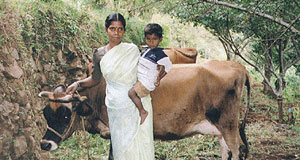Children do not belong in workplaces; they deserve a decent opportunity to develop by learning and by play. This expectation, unfortunately, is far different from reality in India, where millions of children work to augment the incomes of their families. But this needn't be, as the efforts of Forgotten Children show. Founded nine years ago by Francoise Remington, this registered 501(c)(3) non-profit organization is based in Arlington, Virginia, and seeks to improve the conditions of children living in difficult circumstances in the world, mainly through educational projects.
For the past 16 years, Mrs. Remington has been a child rights advocate. From 1985 to 1988, she directed the India Program for the American Adoption Agency, in Washington, D.C. During that time, she traveled extensively throughout India visiting orphanages and sometimes witnessed children working in factories. In response, she established a network of Indian and Nepalese activists who are working to eradicate child labor. In June 1996, she testified on child labor before the Subcommittee on International Operations and Human Rights, Committee on Foreign Relations, U.S. House of Representatives to advocate that the World Bank include a policy against child labor in its lending policies.
Mrs Remington's interest in bringing Indian children out of the bondage of labour touched her own life too - her three children were adopted in the country. In India, Forgotten Children has been working against child labor in Tamilnadu for the past 6 years in partnership with local Indian grassroots organizations. In the beginning, the organization provided direct relief, At first, giving stipends to poor, rural families to allow them to send one child to school for a few hours each day rather than into full-time child labor. The focus now is to assist those who are most disadvantaged - young girls and handicapped children - receive an education.
The mother-daughter project in Kodaikanal is thriving, thanks to the caring and capable supervision of the Sisters of Visitation. They select young girls who, due to very impoverished circumstances, are at risk of discontinuing their studies to become child laborers. The girls attend St. Xavier's Girls Vocational High School in Naiduparam, Kodaikanal, which has been educating children of coolie workers for the past 50 years. The critical part of this effort is that rather than merely ensure the girls' education, Forgotten Children provides ways for their families to offset the loss of income from the children.
 In addition to supporting 2 years of
vocational training for the girls (at a cost of $120 per child),
Forgotten Children provides small interest-free loans (between $100-$400)
to their mothers to help the women generate family income so that their
daughters may continue their education and are not forced into child
labor. Some mothers use this loan to purchase a dairy cow ($400) with
which to produce milk and cheese for the family and for sale; others
choose to grow a vegetable garden ($200) from which they can keep some of
the produce for the family and sell the rest. Some purchase tools ($100)
with which to make household repairs in their community. Some women have
even begun to purchase cholas ovens ($30), environmentally
friendly, smokeless ovens that require little wood. With these,
women can bake bread for the family in a healthier manner and sell some of
the bread for income.
In addition to supporting 2 years of
vocational training for the girls (at a cost of $120 per child),
Forgotten Children provides small interest-free loans (between $100-$400)
to their mothers to help the women generate family income so that their
daughters may continue their education and are not forced into child
labor. Some mothers use this loan to purchase a dairy cow ($400) with
which to produce milk and cheese for the family and for sale; others
choose to grow a vegetable garden ($200) from which they can keep some of
the produce for the family and sell the rest. Some purchase tools ($100)
with which to make household repairs in their community. Some women have
even begun to purchase cholas ovens ($30), environmentally
friendly, smokeless ovens that require little wood. With these,
women can bake bread for the family in a healthier manner and sell some of
the bread for income.
Forgotten Children has helped fund avenues for child development and learning outside the family too; one of its projects is a partnership with The Palni Hills Conservation Council, an environmental organization devoted to promote sustainable development. At the bottom of the road going up to Kodaikanal, the Council has built with local materials a paradise of natural beauty, where small is considered useful and respected. At the edge of the mountain forest, in the tropical plain, flourishing under their care are flowers, trees, bees, butterflies and birds. The plants are irrigated with water pumped by the means of solar energy and their computer is also powered with wind energy. Mr. Kannan, a Council member, educates the students of Kodaikanal about the need to protect the environment. With modest financial support from Forgotten Children, Mr. Kannan and his staff have started a butterfly sanctuary.
Forgotten Children's routine work is a stand against the cruelty of child labour; its response isn't merely the expression of outrage, but a determination to work to end the practice. The mission, says Mrs Remington, "is to improve the conditions of children living in difficult circumstances through advocacy, research, training, and projects, especially in the area of education. Every child has a right to enjoy childhood as well as to learn to read and write".























